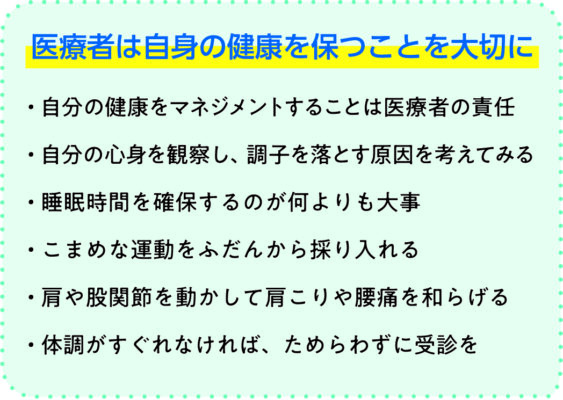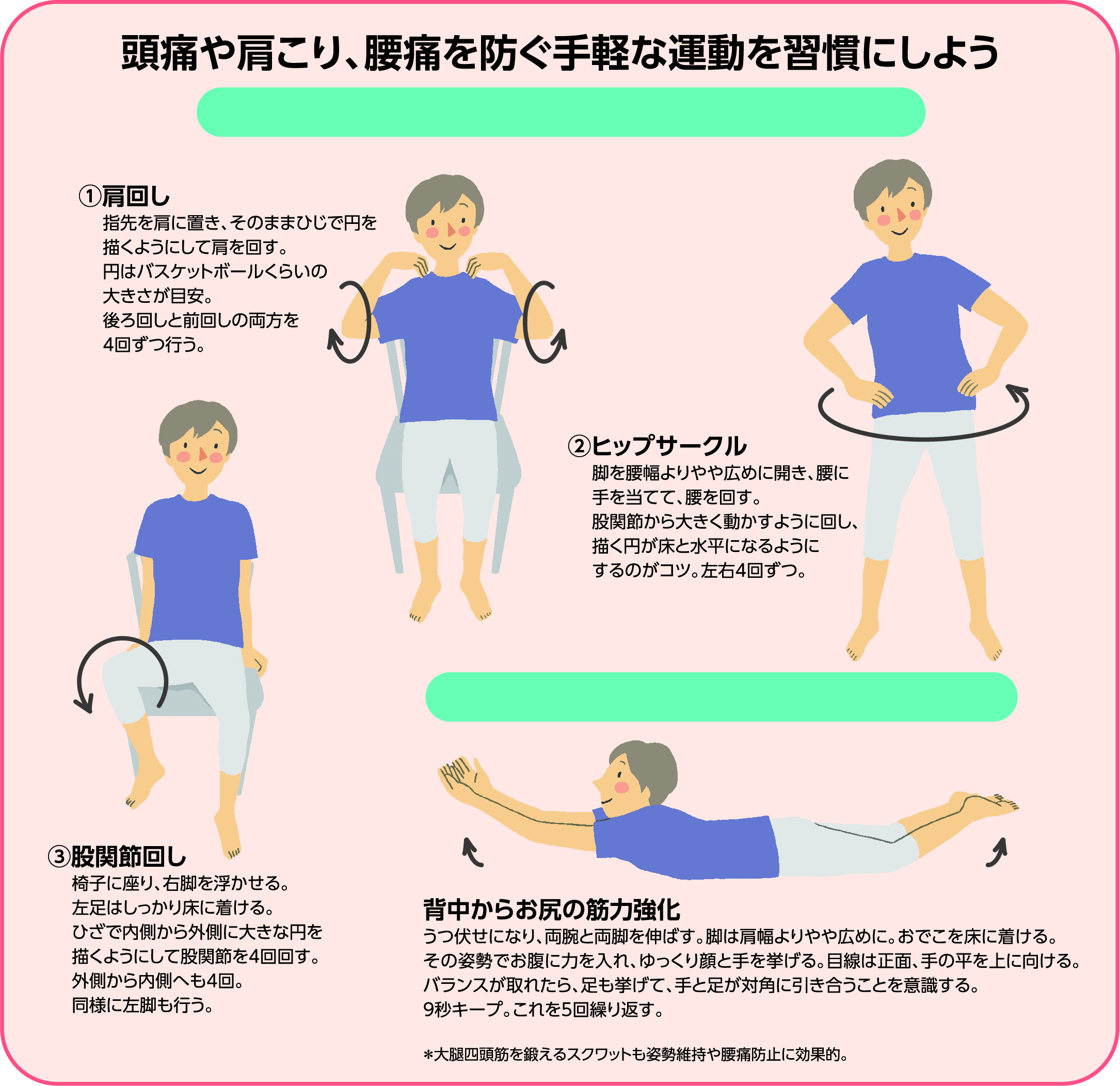ASOURCE®TIMES

アドバイス・運動指導
イーク表参道 副院長
高尾 美穂
医学博士・産婦人科専門医。日本スポーツ協会公認スポーツドクター。東京慈恵会医科大学大学院修了。女性の健康をサポートし、その幸せな人生と前向きな選択を後押しすることがライフワーク。内科・婦人科・乳腺を専門に外来診療を行うほか、SNSによる情報発信、一般の女性・運動指導者・医療関係者に向け、さまざまな講座を開催するなど社会的活動にも精力的に取り組んでいる。
3年続くコロナ禍で医療現場には大きな負荷がかかっています。一方で、医師の時間外労働を減らすための医師の働き方改革の検討が進んでいます。医療者の健康は医療の質に直結する大きな問題で、医療機関の経営者にとっても重要なテーマです。もちろん医療者個人としても元気に働き続けることは人生の大切な目的といえるでしょう。今回は、高尾美穂先生に特に女性の医療者の健康維持に関する考え方、その4つのポイントについてアドバイスいただきました。

「医療者は健康を推進し、実践していくのが役割の1つです。例えば、一見して肥満とわかる医師に“運動しなさい”“食事制限しなさい”と指導されても説得力がありませんよね」と高尾先生は強調します。
「私が運動を続けているのは、運動が好きということもありますが、患者さんや周囲の人にやっぱり運動っていいよって言いたいからです」。
医療者はストレスの高い仕事に従事していますが、「だからといって、タバコでストレスを解消していいわけではありません。他人の健康を預かる立場として、守れる健康は自分で守る健康マネジメントを体現しなければ」と高尾先生はいいます。また、体調をコントロールすることは自分がやりたい仕事を続けるための基盤でもあり、職場での自身の評価にもつながります。
医療は、患者さんを真ん中にして医療者がチームを組み、専門性を活かして多角的に患者さんを診療するのが当然の考え方になっています。こうした中、「医療者は自分の健康をマネジメントし、役割を果たす努力をするのと同時に、チームメンバーを尊重し、誰かに無理がかかっていないか、バランスを考えることも必要になります。そういう配慮や支え合いのもと、メンバーの調子が悪ければ“私がやっておくね”とカバーし合うことで仕事を安心して継続することが可能になり、質の高い医療も提供できると思うのです」。

体調を管理する第一歩は「自分の調子がよいのか悪いのか、調子が悪いとしたら、どういうときに悪くなるのかを観察すること」と高尾先生はアドバイスします。「生活習慣かストレスか、たとえ因果関係がはっきりしなくても、そういう観察は大事です。体調をよくする方法を自分で見つけて実践する大切さはいつも患者さんにもお伝えしています。例えば、生理痛がひどければピルを使ってみるなど、医療者だから試しやすいこともあるはずです。医療者の仕事は患者さんが自分で治していける状態になるのを支援することです。それは医療者自身に対しても同じことです」。
高尾先生が最も重要と話すのが睡眠時間の確保です。ご自身も大学病院に勤めているとき、シフト勤務や緊急手術で睡眠がうまくとれなくなり、「これでは自分の人生によくない」と考えて、大好きなお産を扱えなくなったとしても転職しようと決めたそうです。
「睡眠をちゃんと取るだけで、ゴキゲンに過ごせる可能性が高いので、“今日のお母さんは調子が悪いので、しっかり寝たいからよろしくね”と家事をまかせるなど、家族の協力も仰いで眠ってください。一人暮らしの人でもゆっくりできる夜の時間は貴重だし、夜更かしして何かしたいと思うかもしれませんが、調子よく過ごすためには睡眠を選択するという気持ちを持ってほしいですね」。
次に大切にしたいのが運動習慣です。「私はスポーツジムに行く時間を確保していますが、それが難しければ、こまめに動いてほしいですね。通勤では歩きやすい靴で少し汗ばむくらいの速度でウォーキングをする、電車の中でつま先立ちする、移動に階段を使う、廊下を大股で歩く、エレベーターで1人だったらスクワットする、それだけでも運動量を増やせます」。こうして自分の意思で心拍数を上げ、筋肉を使うと交感神経が活発になり、その分、夜には副交感神経が優位になって眠りやすくなります。
高尾先生のお勧めは全身の関節の中でも大きい関節である肩と股関節を動かすこと。肩も股関節も片側の骨の関節頭が球状で関節窩にはまっている球関節です。この関節は周囲の大きな筋肉とつながっているため、球関節を動かすと多数の筋肉が動き、肩こりや腰痛などを緩和できます(イラスト参照)。「野球選手が打席に入る前などに肩や股関節をぐるぐる回していますよね。あれは簡単な運動で筋肉が動き、血流がよくなって体が温まるから。こうした体の仕組みや使い方を知っておくとちょっとお得です」。
心身の観察、睡眠、運動などを試してみても体調が上がらなければ、「すぐそばにいる医療者になるべく早く相談するのがいいでしょう。これは一般の人に比べると大きなメリットです。それには普段からコミュニケーションを取っておくこと。廊下ですれ違うときに挨拶する間柄でもお互いに役に立てるのが医療者のいいところです」。
患者さんのみならず、病院に来ない一般の人たち、ともに働く仲間に対しても医療者にしかできないことがいっぱいあると高尾先生はいいます。「この仕事は社会に貢献できる尊いもので、それがどれだけ価値のあることなのかを忘れてはいけないと私はいつも意識しています」。
